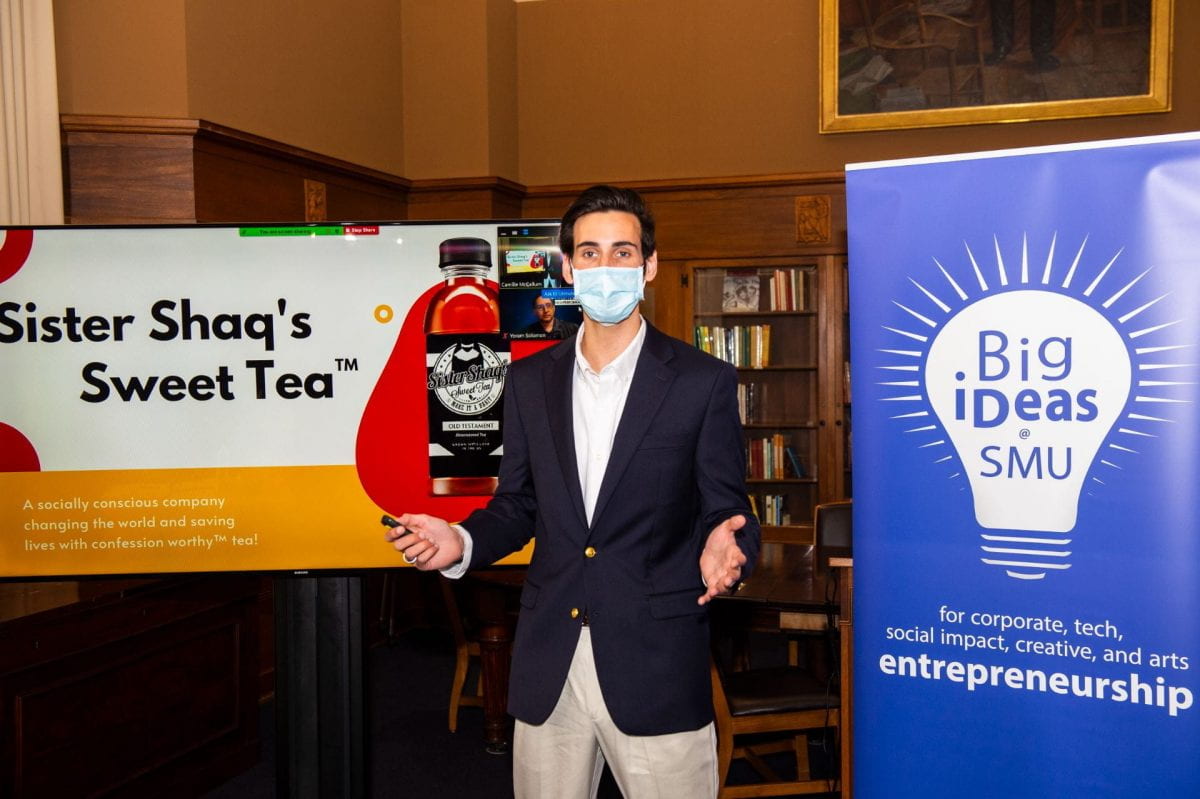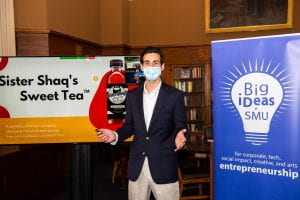This summer we talked with a few of the faculty who hired students to be part of the Office of Engaged Learning’s Summer Research Intensive. Dr. Anindita Das is a new assistant professor in the department of chemistry at SMU who is working with 3 post-doctoral fellows, 2 graduate students and 8 undergraduate students to create renewable energy and deliver drugs using atomically precise nanomaterials. Dr. Das and her students have been working on these highly interdisciplinary projects in collaboration with various other research groups at SMU including the Lippert Lab.
Dr. Das attended Osmania University 2004-2007 for her Bachelor of Science, the University of Prune 2007-2009 for her Master of Science, Carnegie Mellon University for her PhD in 2010-2015, and Northwestern University for her post-doc in 2016-2020. She is an expert in biocompatible nanomaterials synthesis, materials chemistry, nanoparticle characterization techniques, inorganic chemistry, and catalysis.
What led you to conduct your current research?
The field of nanotechnology is making itself present in many kinds of scientific research areas. Dr. Das learned about the field when she moved to the United States ten years ago. For her PhD at Carnegie Mellon University, she got to know about the exciting field of designing materials at the nano scale and then and using this to address challenges in a variety of fields such as, renewable energy and drug delivery. That was the beginning of Dr. Das’ journey.
A major limitation in the field of nanotechnology pertains to the inherent structural inhomogeneity associated with conventional nanoparticles which precludes an atomic-level understanding of their structure-property relationships (e.g., exact catalytic and biological mechanisms). During her PhD, Dr. Das developed strategies to make nanomaterials with atomic precision and molecular purity in order to understand catalytic mechanisms at the atomic level.
What challenges have you encountered throughout your research and how have you worked to overcome those challenges?
Dr. Das says that there is always more to learn. For example, in Organic Chemistry I and II, they do not usually teach you about nanoparticles and how to address issues pertaining to renewable energy or drug delivery. There are techniques you are taught in chemistry courses that you may never use in research, and there are techniques that you will learn about throughout your research which will not be taught in school. So you have to learn throughout the process and adjust. It is all about applying what you learn in school to real-world problems.
What are you currently researching and why? What is the essential question that motivated you to conduct it?
There are different projects within the lab being conducted by different people. The main goal of lab is to circumvent some of the current challenges in the field by developing multifunctional atomically precise nanomaterials to answer critical questions in areas like catalysis, energy storage, targeted drug delivery and sensing, wherein efficiency and reproducibility heavily rely on materials that can be synthesized without batch-to-batch variations.
For example, we are currently collaborating with the Lippert group to develop novel nanoclusters which are capable of exhibiting chemiluminescence, which can help detect diseases at earlier stages. Another important criteria for using nanomaterials for bio-applications is that the probes need to be biocompatible. For instance, the FDA requires that all the drugs and probes that are used to diagnose diseases to be cleared out of your body after its action is done. Hence, our group is focusing on developing nanomaterials which are less than 2 nanometers in size so that these can be cleared from the kidneys after their intended use.
We are also involved in several other projects, such as making new kinds of catalysts based on metal nanoclusters for sustainable reactions including electroreduction of carbon dioxide (which is the main reason for global warming). In this regard, we have synthesized and characterized several new metal clusters with different surface structures and are currently evaluating their catalytic performance.
What resources have you needed to further your work? Have those resources been accessible?
We use the library to try to track down articles that aren’t easily available through other sources. It has also allowed us access to thousands of articles on nanoparticles. Also, in order to accurately study the properties of these interesting materials which lie at the interface of small molecules and solid-phase materials, these need to be analyzed by several techniques such as X-ray diffraction, NMR, FTIR, fluorescence microscopy, etc. Given the highly diverse research groups at SMU, these resources have been easy to access which has allowed our new group to establish various collaborations with the neighboring research labs.
What one piece of advice would you give someone who is interested and conducting an experiment or research project?
Do not be afraid to reach out to professors conducting research in areas you are interested in getting involved with. Take your chances.
Thank you, Dr. Das!

 [Dallas, Texas July 2021] —
[Dallas, Texas July 2021] — 
 Raleigh Dewan is a junior at SMU double majoring in Creative Writing and Marketing with a concentration in Entrepreneurship and minors in Italian, History, and Public Policy and International Affairs. At SMU, Raleigh is a Hunt Leadership Scholar, BBA Scholar, Hilltop Scholar, Pre-Law Scholar, Hegi Career Leader, and a member of the University Honors Program. On the hilltop, Raleigh serves as the Internal Development Chair of Program Council, a member of the Campus Services Student Advisory Board, and is President of the Engaged Learning Student Board.
Raleigh Dewan is a junior at SMU double majoring in Creative Writing and Marketing with a concentration in Entrepreneurship and minors in Italian, History, and Public Policy and International Affairs. At SMU, Raleigh is a Hunt Leadership Scholar, BBA Scholar, Hilltop Scholar, Pre-Law Scholar, Hegi Career Leader, and a member of the University Honors Program. On the hilltop, Raleigh serves as the Internal Development Chair of Program Council, a member of the Campus Services Student Advisory Board, and is President of the Engaged Learning Student Board.
